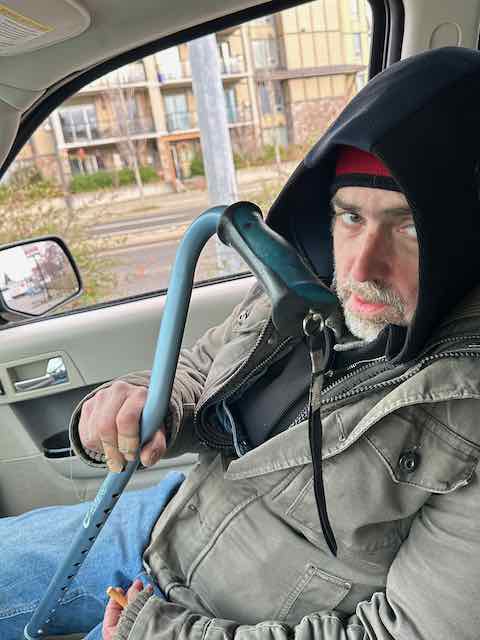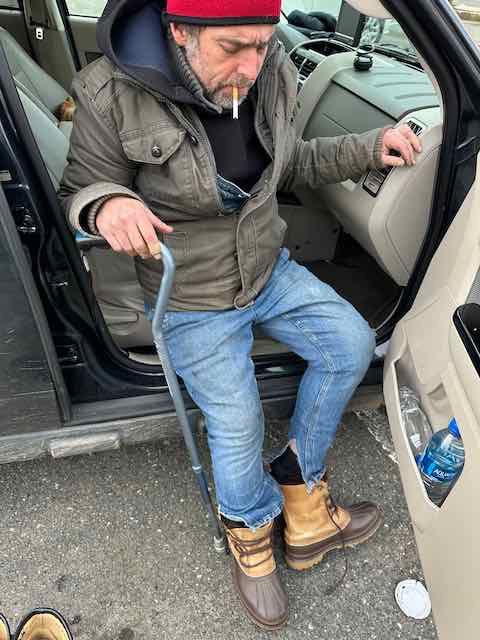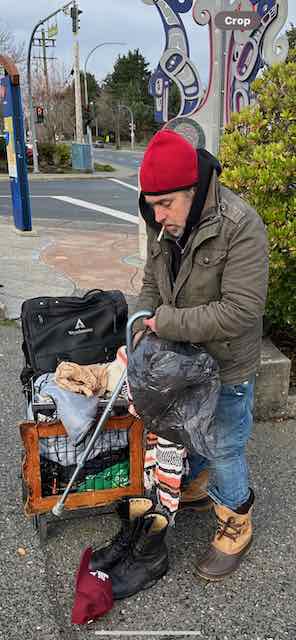This story is posted online at PQB News.
The recent cold snap was a difficult time for people living without sufficient heating or water in precarious housing in the Parksville Qualicum Beach region.
Residents live in trailers — cramped quarters in some cases only eight feet by eight feet. Some don’t have access to basic amenities like a bathroom or kitchen.
Dave (name changed to protect his privacy) is 60 years old and said he has been homeless in the past, so he is thankful to have a place to stay indoors.
“I’ve been to the bottom and I’ve lived picking cans, $5 a day,” he said.
His home was very cold at night, but would have been worse without a space heater he was given by the Manna Homeless Society outreach team.
He’s been fixing up his trailer himself as best he can, gradually putting in new flooring and making other repairs.
“It’s a start, it’s a beginning. I’m stuck at the beginning, but it’s fine,” he said. “It’s better than under the beginning. It’s a good place to stay.”
It was a brutal couple of nights for Sarah (name also changed to protect her privacy), who did not have a space heater at the start of the cold snap. She was given one by her landlord during the weekend, which helped.
“A little bit of a difference. Like when it was really, really cold in here, I could not stay awake. I was going down, and it felt like I was having hypothermia,” she said. “It was really cold in here. You could see your own breath.”
She has lived in a trailer for more than 30 years and in that time has known many people who have died from drug toxicity.
“I heard yelling and screaming and I thought, ‘well OK, I’ll go help this girl’,” she said. “She took me right down there and I walked into something that I didn’t expect. There was a man on the floor, dead. And for a person that has never experienced that situation, and I hope I never have to do it again. I can’t get him out of the back of my mind.”
READ MORE: Point-in-time count reveals unhoused numbers for PQB region
Sarah was previously homeless and addicted to crack cocaine, but said she has been clean for decades.
She’s noticed more and more homeless people arriving in the area lately.
“There’s more and more people that need more help out there than what I do,” she said. “But I need help and I want to get into low-income housing.”
She is grateful for support from the Manna outreach team, which provides food, transportation (bikes), laundry vouchers, hygienic supplies, clothing, rain gear, outdoor survival equipment and mobile medical assistance.
Living in difficult conditions exacerbates medical problems such as diabetes, according to Raquel Molina, a foot care nurse who volunteers with Manna.
“The feet are a big deal because they’re often wet and cold,” she said. “It’s actually hard for me to peel somebody’s boots off because they’re embarrassed because they haven’t had a shower for so long.”
If Molina sees someone limping, she insists on examining the condition of their feet.
People who aren’t able to keep their feet dry can end up with skin problems, she said, with their skin peeling off or becoming cracked and sore.
“I was also just talking with a guy who’s about to have knee surgery and he lives in the woods, so you can imagine trying to convalesce from that,” Molina said.
“He might try to beg and borrow a bed for a little while, I don’t know. In February he’s having knee surgery. I think a big part of that is people coming out and not having a place even to stay warm and dry.”
Manna volunteers in the area also recently found several people “lying on the floor in an ailing state,” attributed to dehydration due to the lack of a needed water source, according to Robin Campbell, president of the Manna society.
More information about Manna can be found at mannahomelesssociety.com.










